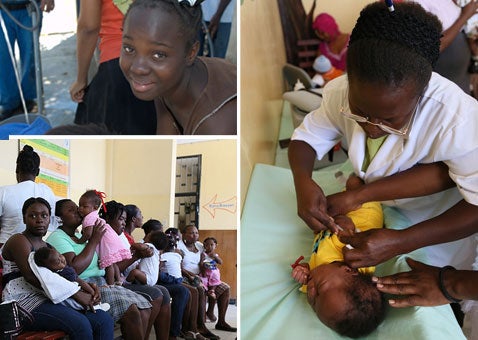

Four years after the earthquake that claimed some 230,000 lives, Haiti has advanced in its recovery but continues to face long-term challenges in meeting the health and development needs of its population.
For 2014 and beyond, PAHO/WHO and UN partners say cholera elimination will be a top priority
Washington, D.C., 12 January 2014 (PAHO/WHO) — Four years after the earthquake that claimed some 230,000 lives, Haiti has advanced in its recovery but continues to face long-term challenges in meeting the health and development needs of its population.
PAHO/WHO has supported Haiti during the recovery process and the cholera epidemic that began 10 months after the Jan. 12, 2010, quake. Among major accomplishments during this period are:
 Over 60,000 families displaced by the earthquake have returned to their homes or relocated (representing 89% of those originally displaced).
Over 60,000 families displaced by the earthquake have returned to their homes or relocated (representing 89% of those originally displaced).- The number of people suffering severe food insecurity declined from 1.5 million in early 2013 to 600,000 in October of the same year.
- The number of cholera cases has declined from over 350,000 in 2011 to some 56,000 in 2013.
- The cholera case fatality rate declined during 2011 and 2012 from an average of 2.2% in late 2010 and stood at 1.2% at the end of 2013.
- Maternal and infant mortality have declined to below pre-earthquake levels.
- In 2013, the government of Haiti (along with the government of the Dominican Republic) launched a 10-year action plan to eliminate cholera from the island of Hispaniola.
"For us, assisting Haiti is a top organizational priority," said Carissa F. Etienne, Director of the Pan American Health Organization/World Health Organization (PAHO/WHO). "We believe that eliminating cholera must be a priority for the entire international community, not only to save lives in Haiti but also to protect the health of people throughout the Western Hemisphere."
The cholera epidemic—which has claimed more than 8,000 lives since 2010—remains a major health and development challenge. In 2013, the disease continued to sicken on average over 1,000 people each week and in the past two years has spread beyond Hispaniola to Cuba and Mexico. PAHO/WHO has supported the response to the epidemic, most recently as a founding member of the Regional Coalition for Water and Sanitation to Eliminate Cholera in the Island of Hispaniola. With partners including UNICEF, the U.S. Centers for Disease Control and Prevention (CDC), Spain, and others, PAHO/WHO is providing technical support, undertaking advocacy efforts, and mobilizing resources for cholera elimination.
In addition to this support, PAHO/WHO has worked with the Haitian government throughout the recovery process to strengthen overall capacity in health and disaster preparedness. Examples include technical cooperation to:
- Develop tools to make hospitals and health centers more resistant to natural disasters.
- Develop a five-year national plan to improve nutrition and implement policies for micronutrient supplementation.
- Prepare and launch a three-year national strategic plan for reproductive health.
- Develop a national plan to improve disease surveillance and strengthen the country's early warning and response systems.
- Strengthen data collection and analysis on mortality and its causes.
- Implement a comprehensive program to reduce maternal and child mortality in all major hospitals.
- Update the national strategic plan for HIV/AIDS 2008-2012 and extend it to 2015.
- Introduce the pentavalent vaccine into the national child immunization schedule.

In 2014 and beyond, a key focus for PAHO/WHO and the entire UN System will be to support Haiti's 10-year action plan for cholera elimination, which calls for $443.7 million in investments over two years and $2.2 billion in investments over the next decade.
"In 2014, we will redouble our own efforts and seek more support from other members of the international community to eliminate cholera and put Haiti more securely on the road to health and development," said Etienne.
PAHO, founded in 1902, is the oldest international public health organization in the world. It works with its member countries to improve the health and the quality of life of the people of the Americas. It also serves as the Regional Office for the Americas of WHO.
Links:
- www.paho.org/disasters
- www.paho.org/cholera
- www.paho.org
- https://www.facebook.com/PAHOWHO
- https://www.youtube.com/pahopin
- https://twitter.com/pahowho#Haiti
- https://twitter.com/opsoms
Media Contacts:
Leticia Linn, linnl@paho.org, Tel. + 202 974 3440, Mobile +1 202 701 4005, Donna Eberwine-Villagran, eberwind@paho.org, Tel. +1 202 974 3122, Mobile +1 202 316 5469, Sebastián Oliel, oliels@paho.org, Phone +1 202 974 3459, Mobile 202 316 5679, Knowledge Management and Communications, PAHO/WHO—www.paho.org



